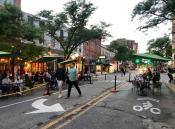Changes are afoot downtown. Enjoying the freedom to drink, dine, and even dance in the streets for two summers has changed the way the city thinks about public space. Business owners and the community at large have decided that they don’t want to return downtown streets to traffic, noise, and pollution just yet. Instead, the city has extended downtown street closures through October this year, and may one day make them a summer fixture. City council is also close to finalizing a downtown “Social District,” which would allow bar and restaurant patrons to move freely between downtown businesses while consuming alcohol.
The Main Street Area Association (MSAA,) an organization “dedicated to keeping our neighborhood businesses strong and vital,” was behind these proposals. Ninety-eight percent of 684 people MSAA surveyed in March responded yes to the question, “Do you want to see downtown block closures again this year, 2021?” Executive director Sandra Andrade emails that “The Main Street Area Association recommends expanding our ongoing recovery strategy to include establishing a social district to our downtown. Currently, over seventy municipalities have approved and supported social districts. We have reached out to a number of these communities and heard nothing but good things regarding the positive impact their social districts have had on their downtown’s economy and businesses as a whole.”
The idea of a social district in Ann Arbor predates the pandemic street closures. In November of 2017, city council briefly discussed closing off select downtown streets annually for the summer season. The pandemic provided an opportunity for the city to give this proposal a test run, and the city found that the results were a rousing success. Next year, the city will decide whether or not the social district will be made permanent.
Other Michigan cities including Northville, Grand Rapids, and Royal Oak are also experimenting with social districts. In light of the heavy toll the pandemic has taken on bars and restaurants, Governor Whitmer paved the way for social districts with a bill that would allow Michigan downtowns to develop outdoor social districts where restaurants could expand seating into the streets and patrons could take alcoholic beverages to go while moving freely between businesses. The result is a vibrant scene full of excitement and activity with friendly faces engaged in conversation and laughter.
Karin Brooks, owner of “Go Blow” hair salon at 335 S Main, said, “We are a newer business, so I really appreciate the foot traffic that this has brought to us. Parking hasn’t really been an issue for us because of the parking structures nearby. We’ve even loaned our sidewalk space out front to the restaurant two doors down.” Julia Goulet of Late Bird Boutique spoke in support. “I am not really directly affected because my shop is off the beaten path of Main St., But I really like what the street closures have done for downtown and for restaurants and other businesses. It seems like it’s brought more people out, and I think that’s a really good thing.”
Some business owners are less enthusiastic. Jay Platt, the owner of “West Side Book Shop” at 113 W Liberty, said that he was in support of the street closures to an extent. “I’m all surrounded by restaurants, and I’ve seen an increase in foot traffic which is a good thing. Though the increase in traffic has made finding parking out back difficult. Some days it takes me forty-five minutes just to find a place to park, so it’s a little inconvenient. Also, all the tents across the street make the place look like a homeless shelter, but I’ve been here for forty-five years and seen a lot of changes. I think there are pros and cons.” A few other small businesses expressed that they felt inconvenienced by the street closures and the increase in traffic but declined to comment further as they felt that they were in the minority that felt annoyed by the Social District.
The implementation of a social district in downtown Ann Arbor is an innovative approach to capacity limits and social distancing that is more than tables in the streets and public spaces where alcohol can be consumed. It’s a new twist on an old concept: people of the community gathered outdoors in the spirit of carefree fun while supporting local businesses whose experience of the past eighteen months has been anything but breezy.
